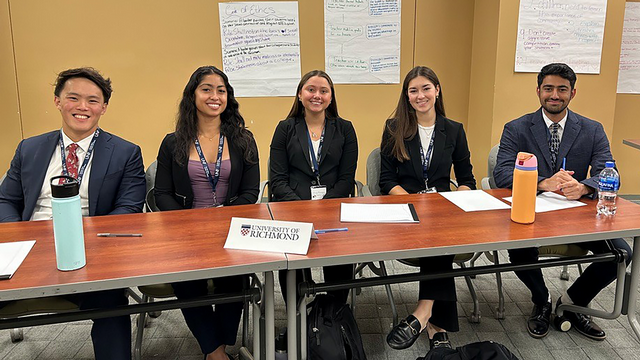University of Richmond team earns spot in national ethics bowl competition
Five Jepson School of Leadership Studies students had the jitters as they entered the giant ballroom at the University of North Florida in Jacksonville the morning of Nov. 1 to compete in the Southeast Regional Ethics Bowl. None had participated in an ethics bowl before, and they were going up against veteran teams at this annual event sponsored by the Association for Practical and Professional Ethics.
But by the afternoon, they were all smiles as they stood on the ballroom stage clutching a trophy. Of the 14 collegiate teams, the University of Richmond team finished second only to a seasoned Georgia Tech team and qualified to compete in the Intercollegiate Ethics Bowl National Competition on March 7-8 in St. Louis.
Seniors Samantha Chiaino, Sassan Fahim, Allyssa Flanagan, Timothy Khoh, and Emerson Linden attributed their success to the skills they learned in Dr. Javier Hidalgo’s class Leadership Ethics Applied in the Field. “The course is designed to improve students’ public speaking, their ability to understand and evaluate ethical arguments, and their ability to work as a team,” said the Jepson School professor.
To that end, Hidalgo devotes half of each class period to teaching discreet public-speaking skills, such as argument explication, emotive speaking, voice modulation, and hand gestures. Students spend the second half of class practicing those skills.
“Public speaking is important in many walks of life,” Hidalgo said, “but it is not something that comes naturally to most people. It requires sustained practice to become good at it. Ethics, too, are important in our professional and personal lives. We learn ethics best when we see both sides and must defend our positions.”
All students in the class compete in ethics bowls: five, with the support of a generous donation from the Richard D. Donchian Foundation, compete in the Southeast Regional Ethics Bowl; five others in a virtual intercollegiate ethics bowl; and still others in in-class ethics bowls.
Hidalgo tasked his students with preparing their arguments and anticipating and responding to counterarguments to all 15 prospective Southeast Regional Ethics Bowl cases. “We collectively decided our position on each case,” he said. “I shared my stance, but sometimes the students chose a different stance. They defended positions they hold.”
“The cases considered the ethics of paying a large sum of money to gain citizenship, choosing body composting as a form of burial, excluding countries ruled by authoritarian regimes from receiving aid, and more,” said Linden, one of the students. “We prepared and knew the cases well going into the competition.”
“Some teams were dominated by one or two members,” Fahim said, “but everyone on our team was equally involved and equally responsible for our wins. Each of us had something to say and time to say it. This earned us points with the judges.”
On Nov. 1, the Richmond team presented its positions and responded to questions in 10 cases lasting 30 minutes each. The Spiders were thrilled and surprised when they advanced to the finals at their first-ever ethics bowl.
“I learned the importance of taking an informed stance on issues and anticipating objections to make stronger arguments,” Flanagan said. Their diverse majors — teammates hailed from all three undergraduate schools — gave them a leg up in considering ethical positions from different viewpoints, she said.
Now the seniors eagerly anticipate competing in the national ethics bowl in March. To prepare, they will further hone their public speaking and persuasive argumentation skills during an independent study with Hidalgo next semester.
“What good is ethics if you can’t apply it?” Khoh said, reflecting on the experience. “It can be a lot of mumbo jumbo. But in the ethics bowl, we considered real-life cases. And now we’re going to bring the game to St. Louis!”
